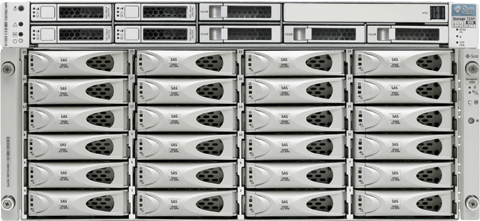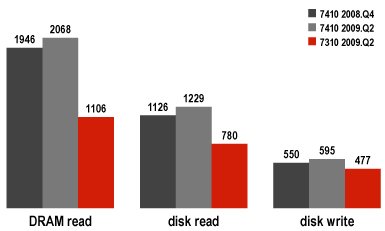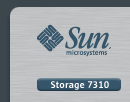
Today we’re introducing a new member to the Sun Unified Storage family: the Sun Storage 7310. The 7310 is a scalable system from 12TB with a single half-populated J4400 JBOD up to 96TB with 4 JBODs. You can combine two 7310 head units to form a cluster. The base configuration includes a single quad-core CPU, 16GB of DRAM, a SAS HBA, and two available PCIe slots for NICs, backup cards, or the Fishworks cluster card. The 7310 can be thought of as a smaller capacity, lower cost version of the Sun Storage 7410. Like the 7410 it uses high density, low power disks as primary storage and can be enhanced with Readzilla and Logzilla flash accelerators for high performance. Like all the 7000 series products, the 7310 includes all protocols and software features without license fees.

The 7310 is an entry-level clusterable, scalable storage server, but the performance is hardly entry-level. Brendan Gregg from the Fishworks team has detailed the performance of the 7410, and has published the results of those tests on the new 7310. Our key metrics are cached reads from DRAM, uncached reads from disk, and writes to disk all over two 10GbE links with 20 client systems. As shown in the graph, the 7310 is an absolute champ, punching well above its weight. The numbers listed are in units of MB/s. Notice that the recent 2009.Q2 software update brought significant performance improvements to the 7410, and that the 7310 holds its own. For owners of entry-level systems from other vendors, check for yourself, but the 7310 is a fire-breather.

Added to the low-end 7110, the dense, expandable 7210, the high-end clusterable, expandable 7410, the 7310 fills an important role in the 7000 series product line: an entry-level clusterable, expandable system, with impressive performance, and an attractive price. If the specs and performance have piqued your interest, try out the user interface on the 7000 series with the Sun Storage 7000 simulator.
12 Responses
Any chance of getting a super low end fishworks box like in an x2270 (4 drive) box? Or even charge for an uplift to fishworks on the small boxes?
Nice to see you listen to your customer base. Even though we did mention the huge gap in the product line up at the orignal launch.
Hope you can ship these quicker that the last lot.
@Karl I don’t think we’re going to go smaller than what we have today with the 7110. With something like the X2270 once we use two disks for booting it’s not that interesting as a storage box.
@kangcool While it might seem like a long time coming, we’re fairly happy with our ability to bring a new member of the 7000 series to market in about the 4 months that it took us. That said, we’re looking to streamline our process to move even faster in the future. While our pace might look slow compared to the server market, we’re moving at light speed for the storage market.
I think there is a market for a Fishworks based NAS below the 7110. However it is IMO a very different market than the 7110 is even in, it is the consumer and really small business market. In that market a max 4 drive system is likely much more interesting, particular if we are talking about 2TB drives. Maybe there is scope for a compromise for such a low end system that the OS and data pools need not be separate – but for a 4 drive system that means solving the boot from raidz or non simple mirror issue.
Regarding the "smaller than 7110" talks… With the 4 disk boxes, why put fishworks on the disks? After removing some of the enterprise features (clustering, JBOD support, etc..) I would think it feasible to get the OS footprint small enough to fit on some mirrored flash tucked away inside the machine, freeing the disk slots for just storage.. Perhaps SD storage is just still too expensive?
I was actually talking about the time it will take for this item to turn up on our doors…
In that I could rush off and buy one today, and expect to see it – what late 2010?
The VARs have been promising a faster supply, but nothing in the last 6yrs.
hopefully oracle will resolve this issue.
@Darren Sure. I don’t know that we have a lot of experience in the SMB market, but it would certainly be interesting.
@jruss We actually have heftier needs on the boot disks than you might imagine due to allowing users to manage a bunch of versions of the software, but even more so for Analytics data which can be extensive.
@kangcool Hear hear.
I was hoping to see the 12-bay JBOD as the lowest end unit connected to the 7310. I have SWAP issues where I would like to install this (not a data center) and the extra 2U of the 24-bay might be a deal breaker. I need the read/write SSD’s so the 7110/7220 are out at the moment. Either way, I love the product…
@Chris Glad to hear you like the product. The limitation in the system today is that the HBA can only see a limited number of targets (a bit over 100), therefore we can attach at most 4 J4400 JBODs. It’s useful input, however, that you’d like to see more capacity behind a smaller head unit; do you have a rule of thumb in terms of head unit horsepower and system capacity?
Hi Can anyone help me with the practical Read and Write IOPS of 7310 with any configuration
Hi,
We require more read & Write IOPS, Can anyone help us with the practical Read and Write IOPS of 7310 with Read Zlog and few Write Zlog as well..
With regards
Nagarajan S
I was happy to see this, as we’re testing a 7410 (nice!) but weren’t sure it was overkill. Liking the density of the 7210, I was going to go that direction, but it limits clustering and expansion potential. This might work out instead.
One quick question – has anyone done any comparison with the EMC CX3-40? We’re faced with paying way too much for continued maintenance on our box, and if a 7310 can beat it, we’re interested in just getting new gear and moving the expensive Clariion to less critical jobs (though we love it immensely – a very nice box, just too much $).
Charles